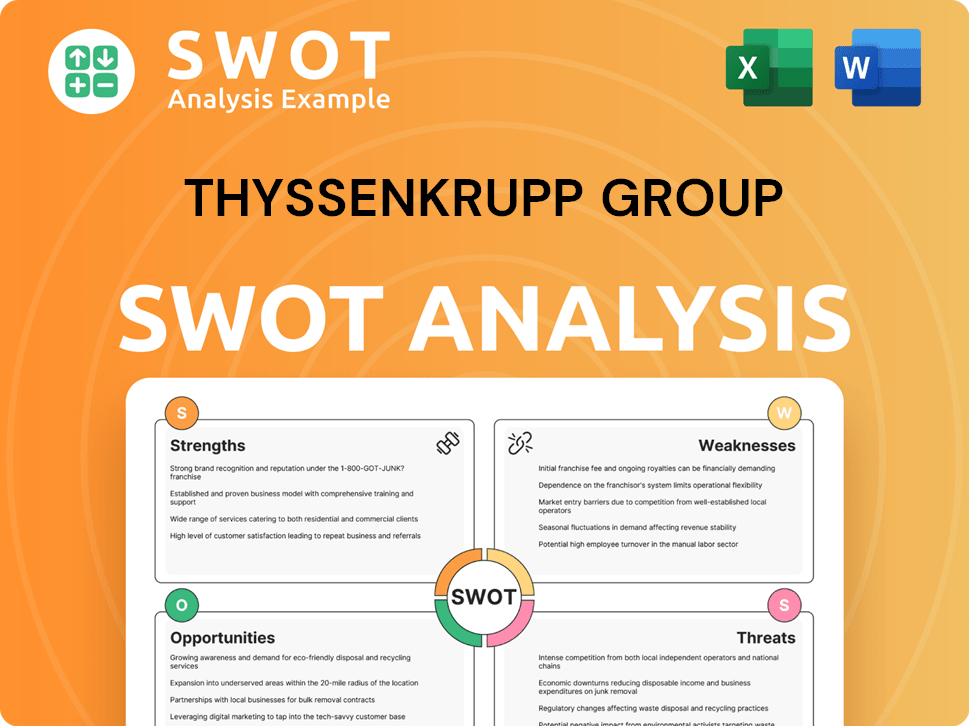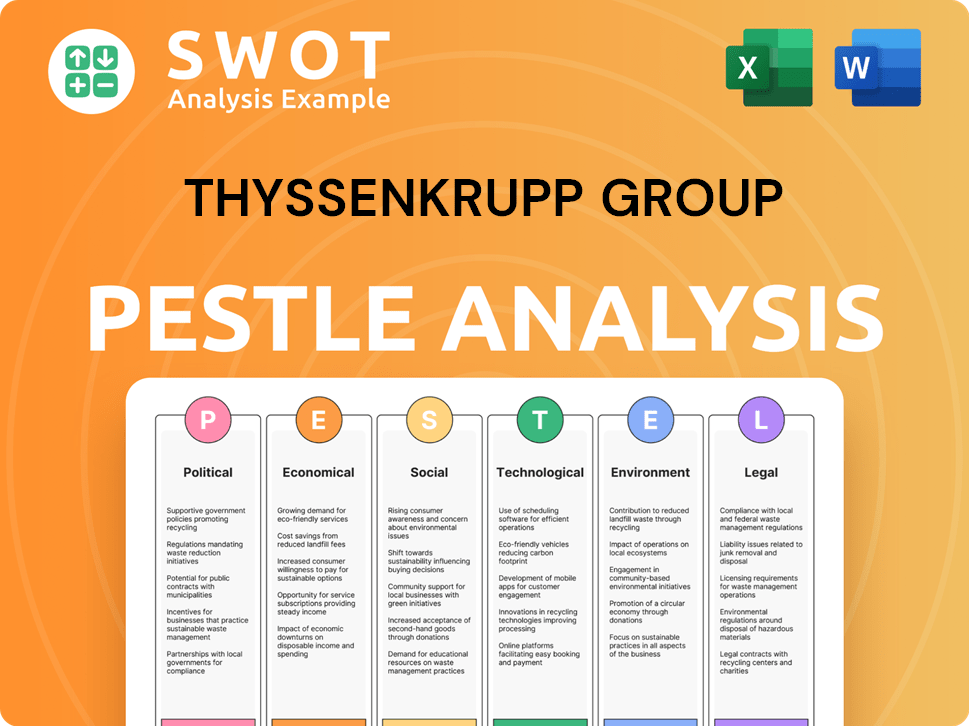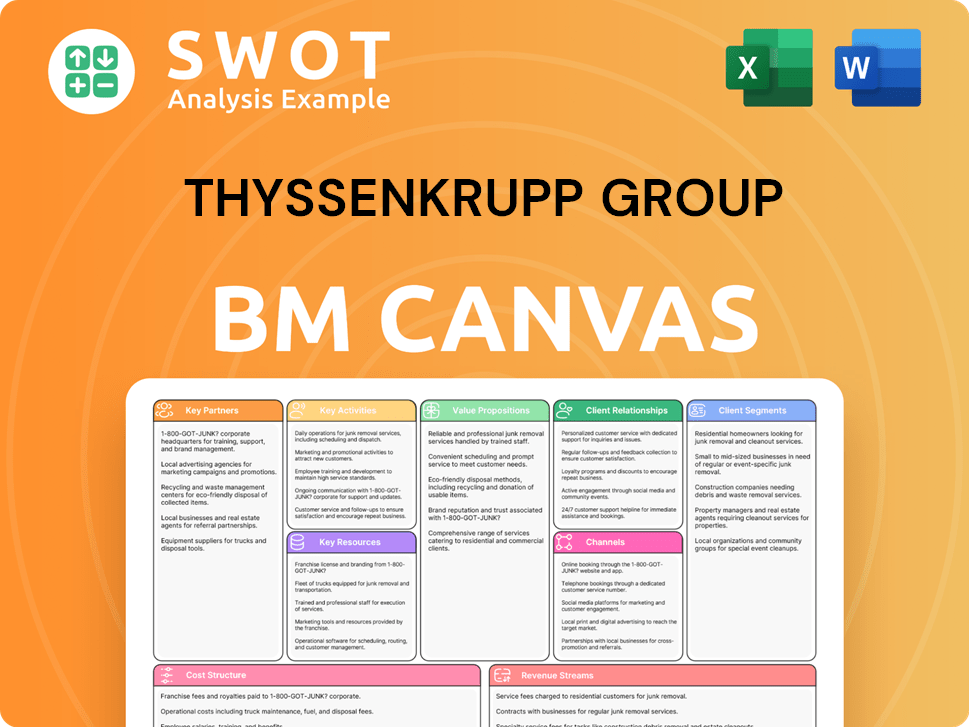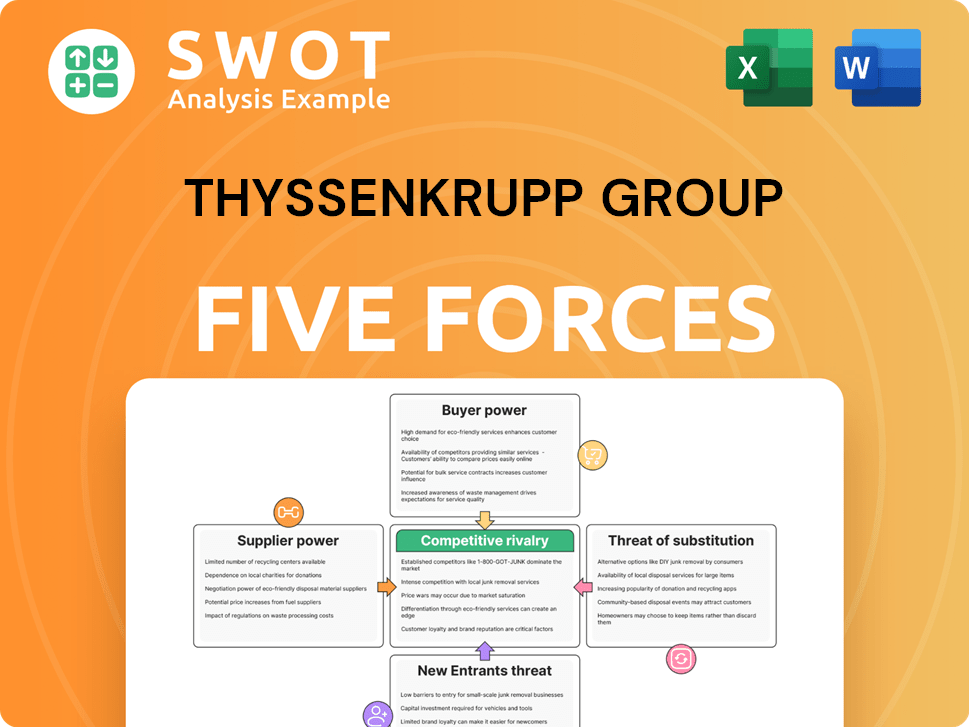ThyssenKrupp Group Bundle
Who Buys from ThyssenKrupp? Unveiling the Customer Profile
Understanding the ThyssenKrupp Group SWOT Analysis is crucial for any investor or strategist. But, have you considered the very foundation of their success: their customers? This exploration delves into the core of ThyssenKrupp's business, examining their customer demographics and target market to reveal the driving forces behind their strategic shifts and market performance.

This analysis goes beyond a simple overview, providing a detailed look at ThyssenKrupp's customer base, from geographic distribution to evolving needs. We'll dissect ThyssenKrupp's target market and explore how the company adapts to remain competitive in a dynamic industrial landscape. Expect a deep dive into customer demographics, market segmentation, and the strategic implications for investors and business leaders alike, including ThyssenKrupp customer profile analysis and ThyssenKrupp target market segmentation.
Who Are ThyssenKrupp Group’s Main Customers?
Understanding the Customer Demographics and Target Market of a company like ThyssenKrupp is crucial for grasping its strategic direction. ThyssenKrupp, a major player in the industrial sector, primarily focuses on business-to-business (B2B) relationships. This means its Target Market consists of other companies rather than individual consumers. This focus shapes its product offerings, marketing strategies, and overall business model.
The company's Customer Segmentation is primarily based on industry. Key sectors include automotive, construction, materials services, and marine. This approach allows ThyssenKrupp to tailor its products and services to meet the specific needs of these diverse industries. For example, the Automotive Technology segment provides components to the automotive industry, while the Materials Services segment caters to manufacturing and production.
The ThyssenKrupp customer profile analysis reveals a focus on large-scale industrial enterprises and government entities. These clients require specialized materials, engineering solutions, and industrial services. The decision-making process for these customers is driven by factors such as efficiency, reliability, cost-effectiveness, technological advancement, and sustainability. The company's ability to meet these criteria is essential for securing and maintaining its customer base.
ThyssenKrupp's main customer groups are in the automotive, construction, materials services, and marine sectors. The company's focus on these sectors allows it to tailor its offerings to meet specific industry demands. This targeted approach helps in maintaining strong customer relationships and market share.
B2B customers prioritize efficiency, reliability, cost-effectiveness, technological advancement, and sustainability. These factors are critical in their purchasing decisions. ThyssenKrupp's ability to meet these requirements is essential for its success in the market.
The Decarbon Technologies segment is experiencing significant growth due to the demand for sustainable solutions. This segment focuses on water electrolysis and chemical plant construction for green hydrogen and chlor-alkali production. This shift reflects the company's adaptation to global trends toward decarbonization.
Segments like Automotive Technology, Materials Services, and Steel Europe have faced weaker demand and lower prices. This has led to efficiency programs and restructuring efforts. The company is actively responding to market changes to maintain competitiveness and profitability.
In the first quarter of fiscal year 2024/2025, the Decarbon Technologies segment saw substantial growth in order intake and sales. This growth was driven by increasing demand in water electrolysis, chlor-alkali, and chemical plant construction. The company is strategically positioning itself to capitalize on the growing market for sustainable solutions, which is a key focus area as highlighted in the Growth Strategy of ThyssenKrupp Group.
- The Automotive Technology, Materials Services, and Steel Europe segments are facing challenges.
- Efficiency programs and restructuring efforts are underway to address these challenges.
- The company is adapting to shifting market dynamics and focusing on sustainable technologies.
- ThyssenKrupp's strategic focus is on long-term growth and sustainability.
ThyssenKrupp Group SWOT Analysis
- Complete SWOT Breakdown
- Fully Customizable
- Editable in Excel & Word
- Professional Formatting
- Investor-Ready Format

What Do ThyssenKrupp Group’s Customers Want?
Understanding the customer needs and preferences is crucial for the success of any business, including ThyssenKrupp. The company's Target Market is diverse, spanning various industries and geographies. A deep dive into Customer Demographics reveals key insights into their motivations and purchasing behaviors.
ThyssenKrupp's customers are primarily driven by practical considerations such as product reliability, cost-effectiveness, and technological advancement. They seek solutions that meet stringent industry standards and contribute to operational efficiency. The company's long-standing reputation and expertise in engineering and technology further build customer trust.
Customer feedback and market trends significantly influence ThyssenKrupp's product development and service offerings. The company adapts to changing demands, such as the growing need for sustainable solutions, by expanding its range of eco-friendly products. This approach ensures that ThyssenKrupp remains competitive in the industrial landscape.
Customers prioritize product reliability and performance, especially in critical applications. ThyssenKrupp's offerings, such as automotive components, are designed to enhance vehicle performance and safety. This focus on quality builds customer trust and loyalty.
Technological innovation is a key driver for customers. They seek advanced solutions that improve efficiency and productivity. ThyssenKrupp continuously invests in R&D to provide cutting-edge products and services.
Cost efficiency is a critical factor for customers. ThyssenKrupp aims to provide cost-effective solutions without compromising quality. This includes efficient supply chain management and resource-conscious operations.
The demand for sustainable solutions is increasing. ThyssenKrupp addresses this through its Decarbon Technologies segment, focusing on green hydrogen and carbon capture. This aligns with customer preferences for environmentally friendly products.
Customers require products and services that meet stringent industry standards. ThyssenKrupp ensures compliance and quality through rigorous testing and certification processes. This commitment builds customer confidence.
ThyssenKrupp's long-standing expertise and reputation foster strong customer trust. This is especially important for complex industrial projects. The company's history of innovation and reliability supports its customer relationships.
ThyssenKrupp's Customer Demographics and Target Market are diverse, but certain needs and preferences are consistent across segments. Understanding these factors is crucial for tailoring products and services effectively. For a deeper understanding of the company's strategic direction, consider exploring the Growth Strategy of ThyssenKrupp Group.
- Reliability and Performance: Customers require products that are dependable and perform well under various conditions.
- Technological Innovation: The demand for advanced, cutting-edge solutions is high, driving the need for continuous R&D.
- Cost Efficiency: Customers seek cost-effective solutions that optimize operational expenses.
- Sustainability: There is a growing preference for environmentally friendly products and services.
- Industry Compliance: Adherence to industry standards and regulations is a must.
- Expertise and Trust: Customers value the company's expertise and long-standing reputation.
ThyssenKrupp Group PESTLE Analysis
- Covers All 6 PESTLE Categories
- No Research Needed – Save Hours of Work
- Built by Experts, Trusted by Consultants
- Instant Download, Ready to Use
- 100% Editable, Fully Customizable

Where does ThyssenKrupp Group operate?
The geographical market presence of ThyssenKrupp is substantial, with operations spanning across 47 countries. The company strategically focuses on key regions, particularly Europe and North America. This global footprint allows it to serve diverse customer demographics and adapt to varied market conditions.
A significant portion of ThyssenKrupp's business activity is centered in Germany, where it holds the position of the largest steelmaker. The United States is another crucial market, especially for its Materials Services segment, which is actively expanding. This expansion includes new sites like the one in Santa Teresa, New Mexico.
ThyssenKrupp's approach involves localizing its offerings and marketing strategies to effectively cater to the distinct needs of each region. This localized approach is crucial for success in diverse markets, considering the differences in customer demographics, preferences, and purchasing power.
In Germany, ThyssenKrupp faces challenges due to high energy costs and bureaucracy, impacting key customer industries like automotive, engineering, and construction. This necessitates strategic adaptations to maintain competitiveness in this crucial market.
The North American market, especially for Materials Services, presents significant growth opportunities. The company is actively expanding its presence there, capitalizing on favorable market conditions and customer demand.
The supply chain services division in the U.S. was recognized as a top Third-Party Logistics (3PL) provider for 2025, reflecting its strong market position and relevance in the North American growth market. This highlights the company's ability to meet customer needs effectively.
ThyssenKrupp is making strategic adjustments, including expansions in growth markets like electric vehicle infrastructure and telecommunications, alongside withdrawals and restructurings in areas like automotive components. These actions are designed to optimize its market position.
The company's strategic decisions are influenced by the dynamics of each region. For example, weakening demand has impacted sales in key segments during the second quarter of fiscal year 2024/2025. This requires continuous monitoring and adaptation of the company's strategies. For more insights, consider exploring the Competitors Landscape of ThyssenKrupp Group.
ThyssenKrupp Group Business Model Canvas
- Complete 9-Block Business Model Canvas
- Effortlessly Communicate Your Business Strategy
- Investor-Ready BMC Format
- 100% Editable and Customizable
- Clear and Structured Layout

How Does ThyssenKrupp Group Win & Keep Customers?
ThyssenKrupp's approach to Customer Acquisition & Retention Strategies is multifaceted, combining traditional and digital marketing with robust sales tactics tailored for a B2B model. The company emphasizes building strong customer trust through its extensive engineering and technology experience, which is a key factor in attracting and retaining clients. Their strategy focuses on direct engagement with industrial clients and strategic partnerships, vital for long-term projects.
Digital initiatives and online presence are continuously adapted to changing market trends and customer preferences, reflecting a commitment to staying relevant in a dynamic business environment. The 'Materials as a Service' strategy, integrating material distribution with data-driven supply chain management, exemplifies a customer-focused approach to logistics solutions, crucial for retention. This strategy leverages data to enhance customer interactions and service delivery, which is essential for effective Customer Demographics targeting.
The company's focus on efficient, resilient, and resource-conscious supply chains indicates a reliance on data-driven insights to manage customer interactions and service delivery. Successful acquisition campaigns are often linked to major project wins, such as the increase in order intake for Marine Systems. Furthermore, ThyssenKrupp's commitment to sustainability through its product range expansion addresses evolving customer priorities, demonstrating a proactive approach to customer retention.
ThyssenKrupp utilizes a mix of digital and traditional marketing strategies. Digital initiatives are continuously updated to align with market trends. The company also maintains a strong online presence to engage with potential customers.
Sales strategies are tailored to the B2B model, focusing on direct engagement. Strategic partnerships are crucial for securing and managing large-scale projects. These tactics are essential for reaching the Target Market effectively.
Personalized experiences and after-sales services are key. The 'Materials as a Service' model offers customer-focused logistics. Expanding the sustainability product range addresses evolving customer needs.
Customer data and CRM systems are critical for targeted campaigns. Data-driven insights are used to manage interactions and service delivery. This helps in understanding Demographic Data and customer behavior.
ThyssenKrupp's strategic initiatives are also geared towards fostering a more agile and responsive organization, which indirectly enhances customer loyalty. For instance, the transformation of the group aims for increased entrepreneurial flexibility and improved transparency for investors. This transformation impacts customer relations by creating a more adaptable and customer-centric environment. To learn more about the company's operations, consider reading this article about the ThyssenKrupp Group.
ThyssenKrupp Group Porter's Five Forces Analysis
- Covers All 5 Competitive Forces in Detail
- Structured for Consultants, Students, and Founders
- 100% Editable in Microsoft Word & Excel
- Instant Digital Download – Use Immediately
- Compatible with Mac & PC – Fully Unlocked

Related Blogs
- What are Mission Vision & Core Values of ThyssenKrupp Group Company?
- What is Competitive Landscape of ThyssenKrupp Group Company?
- What is Growth Strategy and Future Prospects of ThyssenKrupp Group Company?
- How Does ThyssenKrupp Group Company Work?
- What is Sales and Marketing Strategy of ThyssenKrupp Group Company?
- What is Brief History of ThyssenKrupp Group Company?
- Who Owns ThyssenKrupp Group Company?
Disclaimer
All information, articles, and product details provided on this website are for general informational and educational purposes only. We do not claim any ownership over, nor do we intend to infringe upon, any trademarks, copyrights, logos, brand names, or other intellectual property mentioned or depicted on this site. Such intellectual property remains the property of its respective owners, and any references here are made solely for identification or informational purposes, without implying any affiliation, endorsement, or partnership.
We make no representations or warranties, express or implied, regarding the accuracy, completeness, or suitability of any content or products presented. Nothing on this website should be construed as legal, tax, investment, financial, medical, or other professional advice. In addition, no part of this site—including articles or product references—constitutes a solicitation, recommendation, endorsement, advertisement, or offer to buy or sell any securities, franchises, or other financial instruments, particularly in jurisdictions where such activity would be unlawful.
All content is of a general nature and may not address the specific circumstances of any individual or entity. It is not a substitute for professional advice or services. Any actions you take based on the information provided here are strictly at your own risk. You accept full responsibility for any decisions or outcomes arising from your use of this website and agree to release us from any liability in connection with your use of, or reliance upon, the content or products found herein.